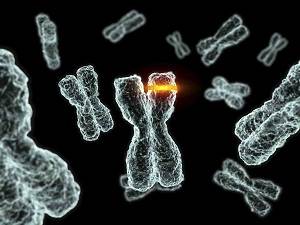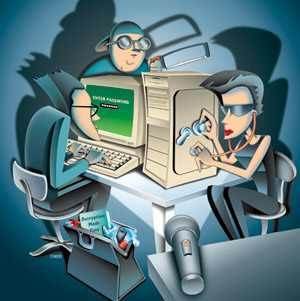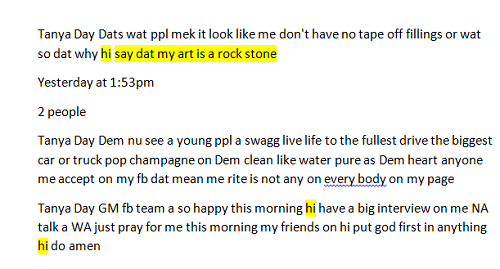WOWZERS

How a Genetic Mutation Led to the White “Race”
Imagine a world where everyone had brown skin. Tens of thousands of years ago, that was the case, say scientists at Penn State University. So, how did white people get here?
Evidently, when humans began leaving Africa 20,000 to 50,000 years ago, a skin-whitening mutation appeared randomly in a sole individual. That mutation proved advantageous as humans moved into Europe. Why? Because it upped the amount of vitamin D the migrants had.
“Sun intensity is great enough in equatorial regions that the vitamin can still be made in dark-skinned people despite the ultraviolet shielding effects of melanin,” explained Rick Weiss of the Washington Post. “In the north, where sunlight is less intense and cold weather demands that more clothing be worn, melanin’s ultraviolet shielding became a liability, the thinking goes.”
The Penn State researchers also found that Asians developed light skin because of different genetic mutations. So, what does this mean? Have scientists identified a race gene? Hardly. As the Post notes, the scientific community maintains that “race is a vaguely defined biological, social and political concept, … and skin color is only part of what race is–and is not.”
As I’ve explained in my “What Is Race?” piece on the Race Relations site, scientists still say that race is more of a social construct than a scientific one because people of the so-called same race have more distinctions in their DNA than people of different races do. In fact, scientists posit that all people are more than 99.9 percent genetically identical.
The Penn State researchers’ findings on the skin-whitening gene show that skin color amounts for a miniscule biological difference between humans.
“The newly found mutation involves a change of just one letter of DNA code out of the 3.1 billion letters in the human genome–the complete instructions for making a human being,” the Post reports.
Still, scientists and sociologists fear that the identification of this skin-whitening mutation may lead people to argue that whites, blacks and others are somehow inherently different. Keith Cheng, the scientist who led the team of Penn State researchers, wants the public to know that’s not so. He told the Post, “I think human beings are extremely insecure and look to visual cues of sameness to feel better, and people will do bad things to people who look different.”
His statement captures what racism is in a nutshell. Truth be told, people may look different, but there’s virtually no difference in our genetic make up. Skin color really is just skin deep.
BADD!!!
http://youtu.be/Db1JywsqkCw
YES CHINA SNEAKING

By Mark Hosenball
WASHINGTON | Wed Jan 18, 2012 5:50pm EST
(Reuters) – Suspicion is growing that operatives in China, rather than India, were behind the hacking of emails of an official commission that monitors relations between the United States and China, U.S. officials said.
News of the hacking of the U.S.-China Economic and Security Review Commission surfaced earlier this month when an amateur “hacktivist” group purporting to operate in India published what it said was a memo from an Indian Military Intelligence unit to which extracts from commission emails were attached.
But U.S. officials who spoke to Reuters on condition of anonymity said the roundabout way the commission’s emails were obtained strongly suggests the intrusion originated in China, possibly by amateurs, and not from India’s spy service.
A large cache of raw email data from the security breach, reviewed by Reuters, indicates that the principal target of the intruders was not the commission, but instead a Washington-based non-governmental pro-trade group called the National Foreign Trade Council (NFTC).
The trade council is headed by William Reinsch, a former top U.S. Commerce Department official who until recently served as the U.S.-China Commission’s chairman.
A large proportion of the raw email traffic downloaded by the hackers consists of messages to and from Reinsch at his NFTC email address. Many of the emails were spam, but some related to the work of the commission, which was set up by Congress to take a critical look at a wide range of U.S. dealings with China.
Reinsch told Reuters that the NFTC first became aware in November that large quantities of its message traffic had been hacked. He said that law enforcement authorities, including the FBI, had been quickly notified. The FBI has declined comment.
Reinsch said he could think of “no particular reason” why the Indian government or Indian hackers would be interested in him. By contrast, he and several other U.S. officials said that Chinese hackers, whether amateur or directly affiliated with Chinese government, would have great interest in the U.S.-China Commission’s activities, both public and private.
SOFT TARGET
Sources familiar with the hacking and the related investigation said they draw two inferences from the fact that the principal target of the hack appears to have been Reinsch’s email account at NFTC.
First, the sources said they found it difficult to believe anyone connected with India would have taken the time or effort to track down Reinsch or his NFTC account, whereas his chairmanship of the U.S.-China Commission made him a potential major target for Chinese hackers.
Secondly, said the sources, the fact that Reinsch’s NFTC emails were the principal target suggests that whoever hacked them was hunting for a soft target with poor cyber-security.
That fits a pattern of what is known as a blended attack: sophisticated hackers often plan attacks in multiple stages, targeting the systems of government officials and corporate executives by first breaching less-secure systems of people with whom they regularly communicate.
“It’s all about trust relationships and getting inside the trust ecosystems — whether they be digital ecosystems or interpersonal relationships,” said Tom Kellermann, a cyber security expert who has served as a policy advisor to the Obama administration.
“Individuals many times are targeted not just for the network of computers to which they have access, but to the network of individuals to which they have access,” said Kellermann, chief technology officer of a company known as AirPatrol Corp.
Pinning down the origin and perpetrator of a particular cyber-intrusion can be very difficult, if not impossible, as hackers frequently take steps to mask their identity or appear that they are from a third country.
One official familiar with the matter said that it was possible that all the hacked email traffic, including messages related to the U.S.-China Commission, originated with the NFTC.
Under this scenario, the reason commission traffic was included in the hacked material was that it consisted of copies of commission messages which were sent to Reinsch at his NFTC email address.
But other officials said it was also still possible some emails were stolen directly from the commission or private email accounts of other commissioners.
A person familiar with details of the incident and related investigation said the hacked emails spanned a six-month period from late March to late October last year. The source said that about 85 percent of the traffic consisted of emails incoming at the NFTC, with the other 15 percent being outgoing messages from NFTC’s server.
The source said that there were significant gaps in the hacked traffic, covering both day-long and week-long periods, bolstering the notion the hacking was done by amateurs.
Investigators are still trying to determine if the hacker successfully targeted NFTC’s local network or a network which fed messages to a mobile device used by Reinsch.
INDIAN MEMO
The purported Indian intelligence memo implied that the commission emails had somehow been hacked using know-how supplied to the Indian government by mobile phone companies who, as payback, were afforded greater access to the Indian market.
One of the mobile phone manufactures named in the purported memo, Apple, denied giving the Indian government backdoor access to its products. A second, Research in Motion, said the company does not typically comment on rumor or speculation, and a third manufacturer, Nokia, declined to comment.
Indian government officials and agencies declined repeated requests for comment on the alleged government document, although some former Indian officials labeled the memo a fabrication.
Two U.S. officials familiar with the hacking incident said they were puzzled why India would go to the trouble of hacking emails related to the U.S.-China Commission, since its work had little if anything to do with India, and Indian officials and diplomats had never showed much interest in its activities.
By contrast, the commission has been a regular target for what officials describe as persistent attempted hacking intrusions, many through the technique of “phishing,” which involves sending bogus but convincing emails which purport to come from insiders but contain malicious code. Investigators strongly suspect these intrusions were launched by people from, or operating on behalf of, China.
A large proportion of the hacked traffic examined by Reuters appeared to be what could be categorized as spam, including summaries of news articles and political fundraising pitches.
Some hacked traffic from the U.S.-China Commission had potentially sensitive implications, however, including messages in which commission personnel discuss matters under deliberation by the organization. These issues included the commission’s attitude toward alleged Chinese theft of intellectual property and congressional deliberations about alleged Chinese currency manipulation.
U.S. officials said there was no indication hackers managed to gain access to electronic files related to the commission’s most sensitive project – a classified version of its annual public report. Electronic materials related to this project are kept on classified servers, isolated from the Internet, which are operated by agencies other than the commission itself, one official said.
(Additional reporting by Jim Finkle; Editing by Eric Beech and Philip Barbara)
POLITICSTECHMEDIACHINA
http://www.reuters.com/article/2012/01/18/us-usa-china-hacking-idUSTRE80H1ZJ20120118
****RULES**** 1. Debates and rebuttals are allowed but disrespectful curse-outs will prompt immediate BAN 2. Children are never to be discussed in a negative way 3. Personal information eg. workplace, status, home address are never to be posted in comments. 4. All are welcome but please exercise discretion when posting your comments , do not say anything about someone you wouldnt like to be said about you. 5. Do not deliberately LIE on someone here or send in any information based on your own personal vendetta. 6. If your picture was taken from a prio site eg. fimiyaad etc and posted on JMG, you cannot request its removal. 7. If you dont like this forum, please do not whine and wear us out, do yourself the favor of closing the screen- Thanks! . To send in a story send your email to :- [email protected]






Recent Comments